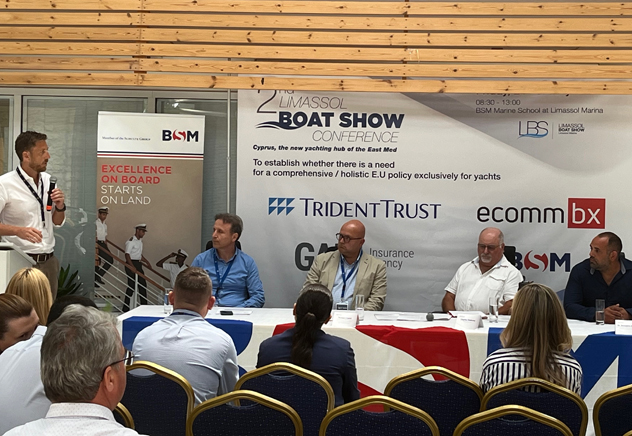
Dr Angelos Menelaou among panelists during Limassol Boat Show, on a holistic EU policy for yachts

A panel discussion held in Limassol shed light on the threats to the marine environment, arising from the growth of the nautical tourism sector. Dr Angelos Menelaou and Dr Demetris Kletou were invited to discuss possible solutions.
On May 24th 2024, Dr Angelos Menelaou, Head of the Department of Maritime Transport and Commerce at Frederick University and Project Manager of EMMERA (East Med Cross-border Marine Environmental Risk Assessment through E-Platform Integrated Data Management), was invited to moderate a panel on Environmental Management at the 2nd annual Limassol Boat Show.
The event addresses topics relevant to “Cyprus, the new yachting hub of the East Med”. The objective for this year’s conference was to establish whether there is a need for a comprehensive/holistic EU policy exclusively for yachts. Dr Menelaou invited fellow panelist Dr Demetris Kletou, a Lecturer at Frederick University, founder of Marine Environmental Research Labs (MER) and researcher on the EMMERA project, to describe the potential threats to the marine environment arising from the growth of the nautical tourism sector.
An earlier study undertaken by Frederick University in collaboration with the Limassol Municipality identified such risks and recommended mitigation actions. Some of these recommendations have since been addressed by the relevant policy makers and industry.
The EMMERA project is one such recommendation. In the frame of the EU funded project, implemented in collaboration with the University of Piraeus Research Centre, University of Haifa and the Port Authorities of Limassol and Elefsis, a robust methodology will be determined and employed to conduct a risk assessment for the ports and neighbouring areas of offshore activity in Limassol, Elefsis and Haifa.
An intelligent digital platform will be designed and developed to maintain and integrate cross-border static and dynamic data, identify areas of potential risk and continuously improve algorithms as new data is received and analysed.

